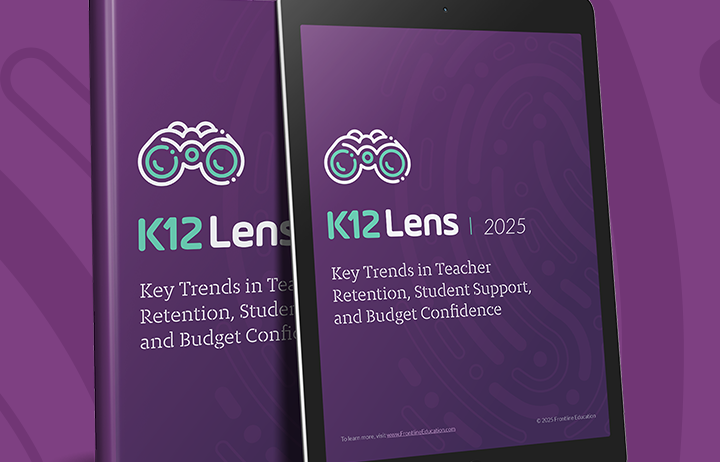In Hanover County Public Schools, there’s a shift happening… something bubbling up from deep within the Curriculum & Instruction Department. Something exciting.
In the past, teachers would complete their professional learning requirements in large part by participating in mandated sessions for two days every August. “The problem is,” says Dr. Steve Castle, Director of Professional Learning and Leadership Development, “it felt forced, and it felt like there’s no choice in this, and teachers were given the things that were required.”
So, for the past several years, Dr. Castle and Chris Biagiarelli, Instructional Technology Project Coordinator, have been on a mission to change the culture around professional learning — so teachers select the learning opportunities that will most help them in the classroom. In this podcast, we ask them how they’re making that happen.
Listen to this 14-minute conversation and hear:
- The steps they’ve taken (and continue to take) to change mindsets around professional learning within the district
- Why the right technology is crucial to making this change
- What they’ve learned, and what they would change if they were starting this journey all over again
Listen on Apple Podcasts, Google Podcasts, or Spotify.
Don’t stop there!
Be sure to check out these resources about professional learning and supporting teacher growth and voice and choice:
- [Case Study] Culture Change: Moving Toward Teacher-driven Professional Learning — How Hanover County Public Schools uses Frontline Professional Growth to offer teachers a voice in their learning and bid farewell to a ‘check the boxes’ mentality.
- Effective Professional Learning Strategies (that Actually Work) — A look at the national landscape of professional development, best practices for an effective professional development program, resources for getting started, and more.
Episode Transcript
DR. STEVE CASTLE: Here in Hanover, we have had a history of checking boxes and marking things off the list that had to be done. The problem is that it felt forced and it felt like there’s no choice in this, and teachers were given the things that were required.
RYAN ESTES: Today, a look at what it takes to change the culture around professional learning, and how one school district in Virginia is finding ways to give teachers more choice in their professional development. And, what happens when teachers just aren’t used to that.
From Frontline Education, this is Field Trip.
Well, welcome, everyone, to Field Trip from Frontline Education. I’m Ryan Estes, and today I’m joined by Dr. Steve Castle, Director of Professional Learning and Leadership Development at Hanover County Public Schools in Ashland, Virginia, and Chris Biagiarelli, Instructional Technology Project Coordinator at the same district. Gentlemen, I’m really glad to have you both here.
We asked you to come on the podcast today to talk about something you’ve been working on at Hanover County for several years, and that is the idea of changing the culture around professional learning in your schools. Before we get into what you’re doing and how, I want to start with the ‘why.’ What made you say, ‘We want to make a change’ here?
STEVE: I think the easiest way to describe it is by saying, we know when people are invested for themselves and see value in what’s happening. It’s much easier to work through potential growth opportunities, to give them additional chances to improve upon their practice. And so rather than force feeding people, if you will, we’re giving them the chance to see why and how it can have a huge impact on our students.
Here in Hanover, we have had a history of checking boxes and marking things off the list that had to be done. And we want to really shift that to a culture of wanting to get the things done and not even worrying about the points and the hours that are required because you know you’re going to far exceed those when you feel the value of what you’re experiencing.
RYAN: I wonder if you could paint a picture of what that checking boxes mentality looked like before. What are you moving away from? And then, how are you going about fostering that kind of change?
STEVE: We still have a requirement built into teacher contracts where roughly two days of time is spent in professional learning that is supposed to be contracted outside of the regular workday experience that teachers have in the 180-day school year. And so that required teachers to spend time during the summer, not during the regular work time, but fulfilling those hours through professional learning sessions. I think the intentions behind that were really good, that we were saying we value professional learning so much that we’re building this into a contract that you need to come and work through and and grow.
The problem is that it felt forced and it felt like there’s no choice in this, and teachers were given the things that were required. So we’re trying to, we’re turning the R word of ‘required’ into a curse word here in the county, and trying to move away from that to a teacher choice model to give teachers as much autonomy in selecting the places where they need to go and grow as much as we possibly can.
Obviously, there are division goals and there are departmental goals and curriculum and content goals that we have to meet as well. And so often we are giving them as many of those opportunities as we can that also meet our needs, but also giving flexibility where they can go outside of the district, accomplish those 14 hours of training that they need somewhere else, but no longer are they required to complete that just during the summer. It used to be two specific days on the calendar. They had to come regardless during those two days. And so in essence, there really wasn’t any choice at all. Everyone came on the two days and that was it. So we now have taken those two days and given teachers any time past June 1 throughout the entire school year, all the way to the Monday following our spring break. At least that’s what we’ve done for the last couple of years to complete those 14 hours, and that can be done during the summer as they’ve been doing, or it can be done during the year. And after school or before school workshops, if you wanted to attend a professional learning session that was even outside of the district, you could do that as well to receive points and credits for what it is that you need to accomplish.
RYAN: Steve said one of the things that they do is host internal conferences for teachers, leaders, and administrators. They might be focused on instructional technology, or blended learning. And they hold a conference designed offer teachers a ton of choice, with shorter sessions that staff can pick from.
STEVE: The other thing we did within that conference was create a mindset where administrators are coming to the events and learning side by side with their teachers. Whereas in the past it’s been, ‘Here’s the thing that teachers are going to go to. Here’s the thing where administrators are going to go to, and now we try to marry that together after the fact when we’re doing observations and walkthroughs.’ So rather than doing that afterward, we’re doing it together. ‘ Here are the best practice techniques we want to see. Here’s how you the administrator can support it, and here’s how we’re going to grow together as we work through this school year.’
But then in everything we’re doing, we’re really trying to reattach this as a holistic process from top to bottom. And so my supervisor constantly says, ‘What’s the through line?’ If we want teachers to know this, or students to know this, then start with our students, then our teachers, then our leaders of teachers, then our leaders of the leaders. So what’s the through line that we need to establish as we’re creating this professional learning, as we’re working through comprehensive plan goals? Making all of these connections in a systematic approach is really a big part of that change in our thinking and philosophy.
Technology also plays an important role in fostering this kind of mindset – technology that the district didn’t have just a few years ago. At the time, teachers were required to take certain professional learning. They were provided a list of titles, and would register using a sign-up service the district was using at the time. Chris Biagiarelli said the system they were using only reinforced the prescriptive nature of the program.
CHRIS: I think the downfall of that is that we were in a product and we didn’t have the right mindset. Instead of it being more of a course catalog where teachers could search and choose and find what was right for them, again, they were being prescribed course codes and section codes to sign up for. So, I was really excited when we switched to Frontline.
RYAN: And here, Chris is referring to Frontline Professional Growth, the system that Hanover County uses to manage and track professional learning for teachers and staff.
CHRIS: And we were able to really build out a course catalog the way we wanted and have it set up so it was easier for teachers to find things. Frontline knows your job, your department, your grade level, so when you arrive in that catalog, it’s already pre-filtered for you, which makes it a lot easier for you to find things.
We’ve also come away from the list, the sheet of things on it. And we constantly have teachers asking, ‘Okay, well just tell me what I need. What are the courses I should be looking for?’ And we’re not producing those lists anymore. Instead we’re saying, ‘It’s in the catalog, go to Frontline, log in there and find what you need there.’
The other benefit of all this comes on the other end with our specialists and our administrators. Before, they had absolutely no idea what their faculty and staff were signing up for. They had very little visibility, but now they have all the visibility they want. So it’s very easy to see, even if our math specialist wants to see, ‘Hey, how many of my new teachers are signing up for this very important math workshop?’ It’s very easy to run a report like that now and provide that.
RYAN: Tell me, what would you say has been the hardest thing about going on this journey? And if you were to suddenly start from scratch again tomorrow, what might you choose to do the same or differently than you did?
STEVE: I think back to a particular staff meeting that I came to one of the elementary schools, and the communication piece where we made some assumptions that people would just get it and they would understand and they would run forward because it’s such a great thing. And we had this culture, this previous culture, so firmly entrenched in their minds that it was very difficult for them to comprehend where we really wanted them to go. And so I’m in the staff meeting and we were talking about a professional learning day that we had on the calendar coming up soon. And one of the teachers asked me, she said, ‘Well, what do you mean, we can literally just pick whatever we want to do?’ And that was a shock to her. And I was like, ‘Yes.’ And this was just mind blowing to her and several other people in the room because they had been told what to do for so long. They really had no concept of how to even start choosing for themselves what is a great idea or where I want to grow and how to reflect.
The other impact this has made is on our evaluation system where we’re pushing more reflection, more genuine practice, into what we’re evaluating more than anything else. And so that really was a huge change for us this year as well. We sort of revamped and republished and changed some of the process procedures that we’re doing for evaluation. And so I think this is also reflected there.
So I guess overall to the answer is, just more about the why and the how we’re moving ahead and our vision for the future, and communicating that more effectively would be the place that I would start.
RYAN: What are your next steps? We’re here right now at the very beginning of the ’23-’24 school year. You’re looking back and seeing five years of progress. What are the things that are on your to-do list this year, next year, the next three years, that you are really saying, ‘This is where we’re going to focus now?’
CHRIS: I would say something that’s in our future plan that we’re actually currently working on, we’re putting a larger emphasis on instructional coaching in our division. We’ve unified our coaching model between our instructional technology coaches, our math coaches, our reading coaches, to take a uniform approach towards our teachers. But the gray area right now, and we have to balance this between what the Code of Virginia says for professional learning and how we track this, is how do we count coaching cycles as professional learning?
And then, utilizing some of those log features within Frontline to track that. I feel if a teacher invests their time into a six week coaching cycle, they should get credit for that. But how do we go about crediting that? Not only for the points and the recertification things, but also for an administrator to be aware of how much of their faculty is currently engaged in an intensive coaching cycle and with who doing what.
The other thing we’re doing a better job with this year than we did last year is, we’re really heavily utilizing the goal section, making sure that every activity in the catalog is really closely aligned to one of our division initiatives or division goals. We just recently finished writing our new five-year comprehensive plan. We need to see the impact of the professional learning that we’re offering on that comprehensive plan. We have this goal for instruction, and if we look at that through line, what are we giving to our teachers in order to accomplish that goal? Do we see that in the walkthroughs that we’re doing in the evaluation? Are we seeing evidence of all that in all three different places? So from a data aspect, just trying to figure out how we really capture that so we see the whole picture and we’re able to triangulate our actual impact.
STEVE: For me it’s continuing to refine some of the existing things that we have. But again, going back, I think one of the areas I would focus more heavily on is the communication structures that we have. And that’s something that we’re doing internally as a department, but also going to be using Frontline more effectively to help us communicate with the calendar that’s available.
But the longer term vision is, again, making some more of these connections from professional learning into the evaluation system that then shows how student performance is improving.
Those are sort of the bigger picture items for me. Specifically, if I want to nail down some things, I think right now I want to attach professional learning to evaluation more. It’s explicitly that it’s very direct. You’re saying, ‘I want to grow after reflection and seeing how my students are performing in the way that I teach. I want to learn and explore this other method and this other way to approach pedagogical practices in my classroom. And now here’s the professional learning that supports that desire.’
RYAN: That is spectacular. Dr. Steve Castle and Chris Biagiarelli work at Hanover County Public Schools in Virginia. I want to thank you both for your time. It’s been really great talking with you about this.
CHRIS: Thanks, Ryan.
RYAN: Field Trip is a podcast from Frontline Education, the leading provider of school administrative software like Frontline Professional Growth, built to help you take a strategic, streamlined approach to professional learning and evaluations. Don’t miss a single episode – you can subscribe anywhere you listen to podcasts. For Frontline Education, I’m Ryan Estes. Thanks for listening, and have a great day.






